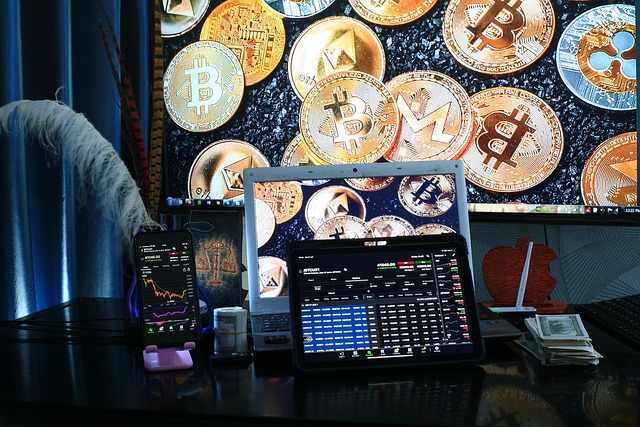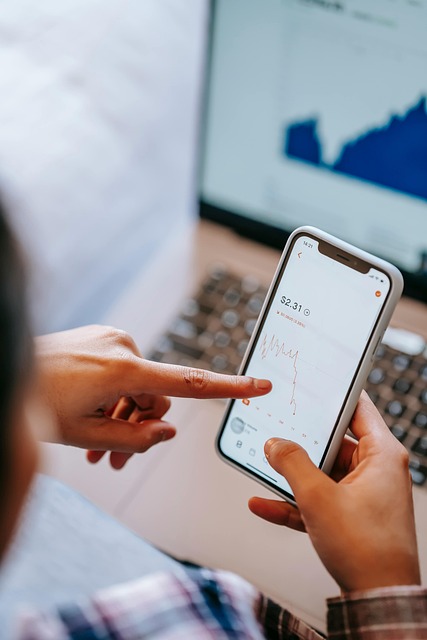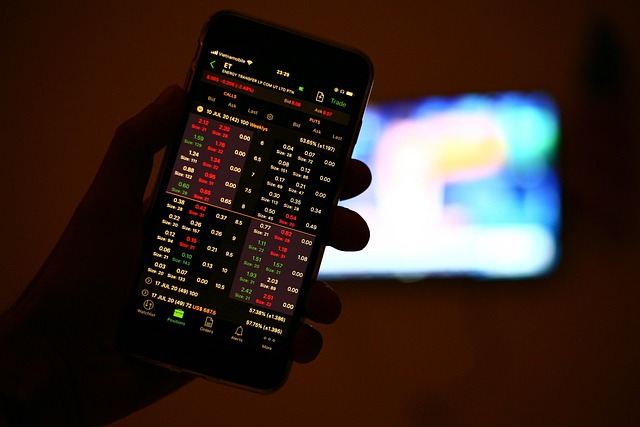Which Is the Best Trading App in Malaysia 2025 — Top Picks and How to Choose
Author: Jameson Richman Expert
Published On: 2025-11-02
Prepared by Jameson Richman and our team of experts with over a decade of experience in cryptocurrency and digital asset analysis. Learn more about us.
Searching for which is the best trading app in malaysia can feel overwhelming in 2025. This guide summarizes the top choices across stocks, ETFs and crypto, explains the features that matter most, offers step-by-step verification and security checks, and gives actionable recommendations for different investor types. Whether you’re a beginner seeking low fees, an active trader needing advanced tools, or a Muslim investor concerned about halal trading, this article helps you choose the right app for your needs and shows how to safely get started.

Why the choice of trading app matters
Picking the right trading app affects costs, execution speed, access to markets, security of funds and ultimately your investment performance. A good app should combine regulatory compliance, transparent fees, strong security, easy funding, solid research tools and responsive support. In Malaysia, you must also consider local regulation and tax reporting requirements before committing to any provider.
Quick overview: Top trading apps Malaysians choose in 2025
- Rakuten Trade — Popular local broker for Bursa Malaysia equities and ETFs. Good for buy-and-hold investors focused on Malaysian stocks.
- Tiger Brokers — Competitive fees and access to US, HK and SG markets; mobile-first platform attractive to active retail traders.
- Interactive Brokers — Broad global market access and advanced tools for professional traders (check eligibility and local support).
- Moomoo (Futu) — Feature-rich mobile trading and in-depth market data; suitable for research-oriented traders.
- Major banks’ investment apps (Maybank/HLB/CIMB) — Integrated banking + investing experience and strong local customer service.
- Crypto exchanges: Binance, MEXC, Bybit, Bitget — Leading crypto trading apps used by many Malaysians for spot and derivatives trading.
Note: Availability and features can change regionally. Always verify whether an app supports Malaysian residents and complies with local regulations before opening an account.
Top picks by investor profile (actionable recommendations)
Best for Malaysian stock investors (local market)
If your primary focus is Bursa Malaysia stocks and ETFs, consider local brokers with direct access to the exchange and local customer support. Rakuten Trade and major bank-backed platforms remain popular choices due to their regulatory alignment and ease of fiat transfers.
Best for low-cost global trading
For access to US, Hong Kong and Singapore markets at competitive fees, platforms like Tiger Brokers and Interactive Brokers are commonly recommended. These platforms provide deeper order types, margin options and advanced charting for experienced traders.
Best for beginners
New traders typically want an intuitive interface, educational resources and low minimums. Many bank investment apps and consumer-focused platforms (Moomoo, some regional broker apps) are tailored to beginners with guided experiences and educational content.
Best for active and day traders
Active traders need low latency, advanced order types, margin/leverage options and robust charting. Interactive Brokers and Tiger Brokers are frequently used, while some professional traders use dedicated desktop platforms for algorithmic trading.
Best for crypto traders
For cryptocurrency trading, Binance is often the go-to for broad token selection and liquidity — though assessing authenticity and security is critical (see the verification checklist below). Other competitive crypto exchanges include MEXC, Bitget and Bybit, each offering different fee schedules, derivatives and promotional incentives. You can sign up for these platforms using referral links if you decide they fit your needs:
- Register at Binance (referral link)
- Register at MEXC (referral link)
- Register at Bitget (referral link)
- Register at Bybit (referral link)

How to evaluate "which is the best trading app in malaysia" — a practical checklist
Answer the following questions to evaluate any app. Use this checklist to compare 2–3 finalists before committing funds.
- Regulation & licensing: Is the broker/exchange licensed by a recognized regulator? For stock brokers look for approvals from the Securities Commission Malaysia (SC Malaysia) or equivalent. For banks, check their investment arm’s license. For crypto, check statements from Bank Negara Malaysia and global compliance notices.
- Fees & commissions: What are trading commissions, spreads, deposit/withdrawal fees, inactivity fees and currency conversion charges? Calculate the total cost for your expected trading frequency.
- Market access: Which markets and instruments are available — Bursa Malaysia, US stocks, ETFs, options, futures, forex, crypto?
- User experience & tools: Does the app offer real-time quotes, charting, alerts, order types, and mobile performance that match your skill level?
- Security & custody: Does the app use two-factor authentication (2FA), cold storage for crypto, insurance coverage and encrypted communications?
- Funding & withdrawals: How fast and cheap are deposits/withdrawals? Are ringgit (MYR) deposits streamlined?
- Customer support & reputation: Are there clear support channels, documented SLAs and a solid online reputation from independent sources?
- Education & research: Does the app provide research reports, market news, or educational content if you need guidance?
- Tax and reporting: Does the app provide statements that simplify tax filings in Malaysia?
- Special considerations (Islamic investors): Does the app offer guidance on Shariah-compliant instruments or resources about whether modes of trading are halal? See an in-depth discussion on halal trading principles for Muslim investors here.
Verifying app authenticity — avoid fake trading apps
Fraudulent apps and phishing scams exist. Follow these steps to confirm authenticity before depositing funds.
- Download only from the official app store listing and confirm the publisher name. Check the app’s website and compare the domain with the app store link.
- Verify the website SSL certificate and domain registration details.
- Look up the company registration and licensing information on the regulator’s website.
- Search for independent reviews and complaints (social media, Reddit, Trustpilot).
- Test withdrawals with small amounts first.
For a practical example of how to verify a crypto exchange’s mobile app and confirm whether a "Binance trading app" is authentic, review this step-by-step analysis on spotting fake apps and confirming authenticity: Binance trading app — real or fake?
Crypto-specific risks and considerations
Crypto trading carries unique risks compared with traditional securities. Consider these factors before choosing a crypto-friendly trading app:
- Token-specific risks: Some tokens face legal or technical challenges (for example, XRP has faced regulatory and network-level issues in the past). Read an in-depth analysis of XRP problems and future considerations here: XRP problems: in-depth analysis.
- Transaction mechanics: Understand how cryptocurrency transactions work, confirmations, fees and the difference between on-chain transfers and off-chain internal balances. A clear primer on Bitcoin transaction processes is helpful for beginners: Bitcoin transaction process explained.
- Custody vs self-custody: Keeping funds on an exchange is convenient but exposes you to counterparty risk. Self-custody requires private key management and additional security steps.
- Leverage & derivatives: Crypto derivatives amplify gains but also increase the chance of liquidation. Verify margin rules and maintenance requirements.
- Regulatory uncertainty: Crypto rules are evolving globally and locally. Stay current with Bank Negara Malaysia guidance and SC statements for the latest policy changes (Bank Negara Malaysia, Securities Commission Malaysia).

Practical walkthroughs: how to get started with different goals
Example A — Beginner who wants to buy Malaysian stocks
- Compare Rakuten Trade and your bank’s investment app on fees and ease of funding.
- Open an account, complete KYC, link your bank account for MYR transfers.
- Use market orders for initial trades; set price alerts for monitoring.
- Request a withdrawal test to confirm your bank transfer flow.
Example B — Freelancer wanting global stock exposure
- Evaluate Tiger Brokers and Interactive Brokers for market coverage and margin options.
- Compare commissions in MYR after currency conversion fees.
- Use demo accounts where available to test the interface and order types.
- Set up 2FA and experiment with small trades first.
Example C — Crypto trader seeking spot and derivatives
If you plan to trade crypto actively, choose an exchange that offers the token sets and derivatives you need, with strong security and liquidity. Commonly used exchanges among Malaysians include Binance, MEXC, Bitget and Bybit. Use the referral links if you opt to sign up:
Before trading, verify the exchange’s app authenticity (see the Binance verification guide above), enable 2FA, read token-specific news (such as the XRP analysis linked before), and practice risk management strategies.
Security & best practices for any trading app
Follow these practical security measures to protect your funds and account:
- Enable two-factor authentication (2FA) using an authenticator app rather than SMS where possible.
- Use strong, unique passwords and a reputable password manager.
- Keep only operational trading funds on exchanges; withdraw long-term holdings to secure wallets if you can self-custody safely.
- Monitor account activity and set email/SMS alerts for withdrawals and logins.
- Beware of social engineering: never share your seed phrase, private key, or 2FA codes.
- Verify app updates are from the official publisher before installing.
Comparing fees and hidden costs — a simple calculation method
Fees can significantly affect returns, especially for active traders. Use this formula to compare candidates:
Estimated Annual Cost = (Average trades per month * cost per trade * 12) + (average bid-ask spread cost per trade * trades per month * 12) + annual account or inactivity fees + estimated currency conversion fees
Example: If Platform A charges RM8 per trade vs Platform B RM2 per trade, and you execute 50 trades per year, the commission difference alone is (50*(8-2)) = RM300 annually. Add spreads and FX charges to get a fuller picture.

Regulatory and tax notes for Malaysian traders
Malaysian residents must follow local tax rules on capital gains and income. Currently, Malaysia does not broadly tax capital gains from the disposal of listed shares for individuals in most cases, but profits from trading as a business can be taxable. Keep records of trades and consult a tax professional. Also, confirm whether the broker/exchange provides tax statements to simplify reporting.
For regulation, check the Securities Commission Malaysia (SC Malaysia) for licensed capital markets intermediaries and read Bank Negara Malaysia’s publications for currency and crypto guidance (Bank Negara Malaysia).
Further learning resources
- Mobile trading and online brokerage background: Online brokerage — Wikipedia.
- General cryptocurrency concept overview: Cryptocurrency — Wikipedia.
- Practical guides and platform verifications from specialist sites — examples include the Binance authenticity guide linked earlier and deeper analyses on token-specific risks (XRP) and Bitcoin transactions on CryptoTradeSignals (links below).
Useful specialist articles and deeper reads (recommended)
- How to check a trading app’s authenticity: Binance trading app — real or fake?
- XRP challenges and what to watch: XRP problems — in-depth analysis
- Halal considerations for day trading and Islamic investors: Is day trading halal?
- Bitcoin transaction mechanics explained: Bitcoin transaction process explained

Final verdict: which is the best trading app in malaysia?
There is no single answer to which is the best trading app in malaysia because “best” depends on your goals, skills and priorities:
- If you want local Bursa Malaysia access and local support, consider Rakuten Trade or your bank’s investment app.
- If you want low-cost global access, evaluate Tiger Brokers and Interactive Brokers carefully.
- If you want feature-rich mobile research and a friendly UI, apps like Moomoo can be compelling.
- If you want to trade crypto with broad token selection, platforms such as Binance, MEXC, Bitget and Bybit are widely used — but verify authenticity and security before depositing (see verification guide linked earlier).
Practical recommendation: shortlist two platforms (one for equities, one for crypto if you need both), run a live test with small deposits, confirm withdrawals, and only scale up when you are comfortable with security, fees and customer support responsiveness.
Next steps (quick checklist to get started)
- Decide which markets you need (Bursa vs US vs crypto).
- Use the evaluation checklist to compare apps.
- Verify app authenticity using the steps in the linkage above.
- Open accounts, enable 2FA and deposit a small test amount.
- Practice risk management and keep learning — use reputable resources and regulator sites for up-to-date guidance.
Choosing which is the best trading app in malaysia is a personal decision based on security, cost, markets and usability. Use this guide and the linked resources to compare options, verify authenticity, and make an informed decision consistent with your investing goals.